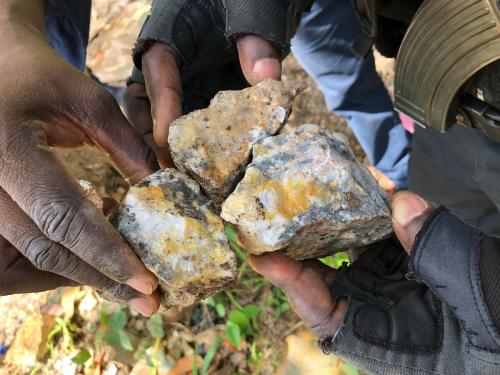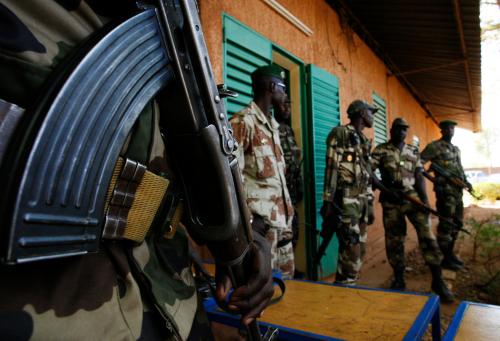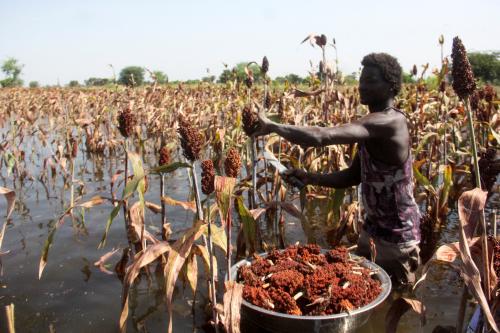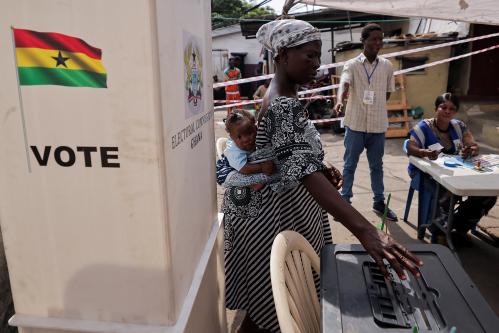Gabon’s elections on August 26 attracted minimal global attention, largely because interest was focused on massive voting irregularities in Zimbabwe’s elections, which were held the same week. Just as with Emmerson Mnangagwa in Zimbabwe, there was little expectation that Gabon’s Ali Bongo Ondimba would lose the presidency. He and his father, Omar Bongo, jointly ruled Gabon as a dynastic fiefdom for more than 50 years. The fact that no outside election observers were allowed to monitor the elections, including the African Union (AU), signaled that both the process and outcome were going to be neither free nor fair and that Bongo cared little about securing electoral legitimacy. In fact, just prior to the elections, his government changed electoral rules and restricted voter freedoms, requiring that voters had to choose both their president and parliamentary candidate from the same party. In effect, this was meant to discourage support for the main opposition leader — Albert Ondo Ossa — who represented a coalition that lacked parliamentary candidates. Yet, when it was announced on August 30 that Bongo won the presidency with 64% of the votes, the commander of the Gabonese Republican Guard, Brice Clotaire Oligui Nguema, led a military coup that placed Bongo under house arrest.
Although Gabon is only the most recent francophone country in West and Central Africa to have experienced a coup, it would be overly simplistic to claim this phenomenon is distinctly tied to French colonial history. Undoubtedly, France’s long-time coddling of African autocrats under a policy known as Françafrique enabled French businesses to benefit from the political stability of supporting entrenched leaders, and France retains an important military training operation in Gabon. However, China has outranked France as Gabon’s biggest trading partner for more than a decade and even manages over half of Gabon’s commercial logging land. Moreover, recent foiled coup attempts have occurred in countries with very distinct colonial histories, including the one in Equatorial Guinea in 2017, Guinea Bissau in 2022, or in Gambia in 2022.
Instead, all of these settings are characterized by leaders who either have run their countries as personal fiefdoms or have been beset by the weak institutionalization of political parties — both ruling and opposition — that lack broad leadership structures and fail to provide much-needed public services. All have also held flawed elections that led to further disillusionment with the democratic process and its ability to improve citizens’ lives. Collectively, these dynamics foster popular grievances that can be leveraged by savvy military entrepreneurs who are either genuinely interested in improved governance or see an opportunity for personal advancement.
What differentiates Gabon’s coup
Unlike the coup in Niger in July, or previous ones in Burkina Faso and Mali, Gabon is not facing the jihadi insurgencies and rising civilian fatalities that were used as an excuse by military leaders there to oust elected governments. Instead, the military officers of the Committee of Transition and Restoration of Institutions claimed they were responding to the country’s “severe institutional, political, economic, and social crisis.” Ironically, Nguema is not only from the same Haut-Ogooué clan as the Bongo family but also had long been close to certain factions of the family, having served as the aide-de-camp to the late President Omar Bongo before eventually becoming the intelligence chief of the Republican Guard and then securing the commander position.
Moreover, unlike the Sahelian countries, Gabon’s natural resource wealth classifies it as a middle-income country, albeit an extremely unequal one with approximately one-third of the country’s 2.4 million people living below the poverty line. Its vast oil, manganese, and timber resources have attracted substantial investment, enabling it to issue several Eurobonds since 2007. Just recently, the country had negotiated a “debt-for-nature” swap where $450 million of its debt was to be transferred to an eco-friendly blue bond. How and whether a military government would uphold commitments to the deal, or how possible sanctions against the country would affect interest rate repayments, remained unclear, leading to a slide in the value of the Eurobonds immediately after the coup. Thus, while previous coups mainly worried the security, humanitarian, and governance communities, the Gabon coup is the first in the region to have serious implications for financial markets.
Similar to the “non-coup” in Zimbabwe in 2017 that ousted Robert Mugabe after more than 30 years in power, Gabon’s coup also raises questions about the moral ambiguity of militaries ousting dictators. The Bongo family’s autocratic grip over Gabon was widely reviled by the local population, civil society, and opposition parties. Bongo’s initial election in 2009 after the death of his father, and his re-election in 2016, both resulted in deadly protests in the capital of Libreville and the arrest of more than 1,000 protesters. In 2019, when Bongo was out of the country for treatment for a stroke, another coup attempt by his previous presidential guard was foiled. Events in Gabon have been closely watched by Cameroon’s Paul Biya and Republic of Congo’s Denis Sassou Nguesso — two other autocrats with close connections to the Bongo family. Biya, in fact, reshuffled his military leadership soon after the announcement of Nguema’s takeover.
Supporting flawed electoral processes fosters popular resentment
In Gabon and elsewhere, a large segment of African citizens appear to be supporting these coups even as African institutions, the West, and other global powers are denouncing them. The AU condemned the Gabon coup and emphasized the return to a “democratic constitutional order.” Similarly, the Commission of the Economic Community of Central African States called for a “return to constitutional order.” These calls are not surprising — coups are never seen as a sanctioned form of regime change — but they are disingenuous in the Gabonese case since the prevailing order was not democratic. Moreover, constitutional orders are repeatedly manipulated by elites in the region. Bongo, for instance, had changed the constitution to his advantage in just April of this year.
One of the main reasons for popular support is that leaders elected in flawed elections, and through non-democratic internal party selection mechanisms, often lack widespread legitimacy. For example, while the Niger coup was primarily motivated by the junta leader worrying about losing his job and financial interests, the outcome resonated with the public. Some analysts claim this is because ousted Nigerien President Mohamed Bazoum was viewed as a puppet of his predecessor and that his victory in the 2021 elections, widely endorsed by the international community, came at the hands of the imprisonment of the main opposition candidate and widespread irregularities.
Consequently, a key question is whether regional and international actors can more strategically support the foundations of democracy. Rather than simply requiring junta leaders to offer a timetable for elections, which has been the response of the AU and other regional economic bodies, there needs to be greater emphasis on, and support for, the deeper foundations needed for a successful democratic transition. This involves genuine dialogue with a diverse range of rural and urban civil society and political parties and enhancing the capacities of institutions, such as legislatures, judiciaries, and the independent media, that are needed to curtail executive overreach. Requiring independent electoral commissions that are properly capacitated is also critical to enhancing citizen trust in electoral outcomes. Particularly in francophone Africa, the Ministry of the Interior often plays a role in organizing elections, often biasing perceptions of their impartiality. In Gabon, as in several other Central African countries, election results are also announced by the Permanent National Electoral Commission all at once rather than progressively, raising concerns about transparency and cheating.
The imperative to better tackle military-civilian dynamics
While flawed elections are undesirable, indefinite military rule is also clearly not a solution. Indeed, the degree of control and surveillance that is needed for effective military engagement does not lend itself to a culture of democratic governance. Several erstwhile military leaders that have re-branded themselves as civilian presidents — such as Nguesso, Uganda’s Yoweri Museveni, and Rwanda’s Paul Kagame — have ruled their countries for decades. Likewise, the military ouster of Mugabe failed to lead to a new dispensation in Zimbabwe.
The ultimate outcome of the Gabon coup is far from certain. Will this be a gatekeeper coup that becomes repressive and violent as it tries to assert its dominance, such as Sudan’s in October 2021? Will it become a caretaker coup that hands over power in elections, as junta leaders in both Mali and Burkina Faso did back in 2013 and 2015, respectively? Or has it been used to settle internal family rivalries, as Gabon’s opposition leader, Albert Ondo Ossa, suspects? While the motivations and trajectory are uncertain, the threat of contagion is certainly real, especially as potential putschists increasingly see there are few serious repercussions to coup behavior.
This points to the need to better identify and address different vulnerabilities within military-civilian relations in the region, including how loyalties are shaped, where factions exist in the military, whether commanders have sufficient equipment to fulfill their mandates, and whether they are invested in certain parts of the economy that could be threatened or advanced by members of the political elite. This would bring us a step forward to better understanding what unites these coups, when they lead to entrenched military leadership, and whether future hotspots can be anticipated.
The Brookings Institution is committed to quality, independence, and impact.
We are supported by a diverse array of funders. In line with our values and policies, each Brookings publication represents the sole views of its author(s).








Commentary
The broader lessons of Gabon’s coup for democracy in Africa
September 5, 2023